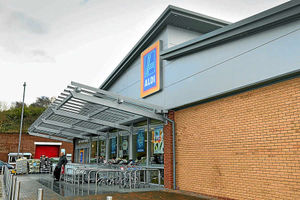Counting the cost of major store wars
Not many people will admit to feeling sorry for Britain's big-four superstore chains, but Tesco, Asda, Sainsbury's and Morrisons are feeling the squeeze in a way they could never have imagined five years ago.

Shopping habits have emerged from years of economic hardship with a whole new direction.
With Lidl and Aldi squeezing from the bottom of the price range, and Waitrose out-performing its rivals in sales of high-end goods, the mid-range grocers are feeling the heat more than ever before.
Tesco was the first of the so-called Big Four to report its results last week, and delivered a six per cent fall in its annual profit to £3.3 billion, as it continues to lose market share to its discounting rivals.
Have you changed your shopping habits in favour of Lidl or Aldi? Vote in our poll and have your say in the comment box below.
Sainsbury's was next on the block yesterday, and despite seeing a ninth consecutive year of profit growth, delivered a measly 0.2 per cent improvement in its stores' like-for-like sales.
Today it's the turn of Morrisons, and the Yorkshire-based retailer has revealed another set of disappointing figures that suggest the introduction of a new strategy and online delivery service have failed to stem the tide of customers heading for the exits.
Kantar Worldpanel, which monitors the grocery market, has now published its latest update which showed grocery market growth of just 1.9 per cent – it's lowest level for 11 years, caused by intensifying price competition among the retailers.
Director Edward Garner said: "There are clear signs that the major supermarkets are reviewing their strategies in the face of increasing competition.
"We're now seeing the big four moving away from 'here today, gone tomorrow' promotions and toward everyday low prices – with Tesco, Morrisons and Asda all announcing price cuts this month.
"The proportion of sales on promotion currently stands at 45 per cent among the big four. By contrast, the figure at Aldi is just three per cent. Tesco now states 'Prices down and staying down', Asda features 'Price lock', Morrisons introduced 'I'm Cheaper – everyday low prices' and the Co-operative has adopted 'Fair and Square' pricing in a move to give shoppers lower everyday prices with greater transparency.
"Lower prices across the board is great for shoppers, but has driven down market growth to its lowest level in 11 years."
But the latest figures also demonstrated the scale of the challenge faced by the Big Four, with Waitrose, Aldi and Lidl all achieving record shares for the 11 week period to April 27 of 5.1 per cent, 4.7 per cent and 3.5 per cent respectively.
Aldi's sales growth rate of 36.1 per cent is an all-time record for the retailer and Lidl's 20.9 per cent growth is its highest since August 2004.
Among the big four, Asda has proved the most resilient, holding its 17.3 per cent market share and narrowly beating the market with two per cent year-on-year growth. Tesco, Sainsbury's and Morrisons have all suffered declines in their market share while Tesco and Morrisons have recorded a fall in actual sales.
Industry heavyweight Tesco saw its market share fall to 28.7 per cent from 30 per cent a year earlier, while Morrisons slipped from a share of 11.6 per cent 12 months ago to 11 per cent over the same period.
Sainsbury's 16.6 per cent share of the market was slightly down after a 0.3 per cent rise in sales compared to a year ago.
But the fightback has begun. Earlier this week, Tesco unveiled a multiple-pronged attempt to recapture the imagination of a public which had lost a lot of love for its best-used retailer.
Following the demand for its Hudl tablet computer, Tesco has now revealed plans to launch its own smartphone, as well as coffee pods to rival Nespresso coffee machines, as it looks to bring shoppers back to its stores with a demand for yet more diversity in its ranges.
It is also to introduce Pound Zones in 300 UK stores as it attempts to tackle low-price retailers with its own bargain ranges, effectively setting itself up in competition with other retail park stalwarts such as Poundland.
Morrisons' own attempt to stem the tide of customers away from its stores has finally led to the fourth-biggest UK retailer rolling out its online delivery service, which it topped up with the launch of an extraordinary range of price cuts last week.
The Bradford-based retailer is to cut prices by an average of 17 per cent on 1,200 products
But this week delivered another double-blow for the retailer.
The group hit the headlines when it projected a baguette onto the side of the Angel of the North in a marketing stunt which infuriated shoppers in the North East. And today its sales took a spectacular tumble as it continued its struggle to get a grip on the mood of the nation's shopping habits.
Changing consumer habits have led to a new outlook for Britain's biggest grocery chains, with some of the best-known brands in Britain sweating over their sales and profits in recent months.
Now the charge to resurrect the public's appetite for major retailers has begun in earnest, and the battle lines have been drawn in a price war worth billions of pounds.
Tesco boss Philip Clarke and his Morrisons counterpart Dalton Phillips have come under pressure as their big-name brands flagged in the face of renewed competition from smaller rivals, and both will stake their names and reputations on the price slashing policy paying dividends – and fast.
Star comment: Fight for shoppers is brutal




